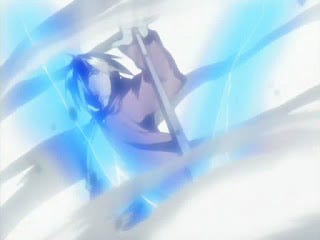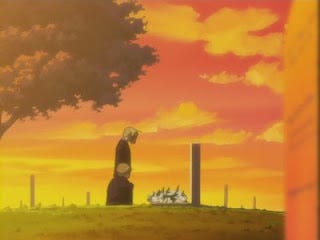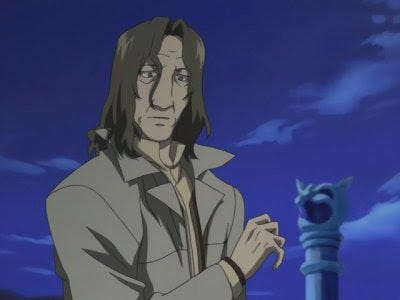Classic Anime Re-watch: Fullmetal Alchemist #1 – Episodes 1-4 start the series off spectacularly

Welcome to Classic Anime Re-watch, an ongoing Fade to Lack feature in which we revisit a classic television anime. Our first ongoing subject is one of the great anime of the 2000s: Fullmetal Alchemist (the first series, from 2003). I will critically analyze each episode’s story, themes, and characters, explore where it all lines up and deviates from the manga, and look at the production values as well. To make things simple, we are covering 4 episodes every week (one DVD volume in the original North American release from FUNimation), and the entire series is currently streaming on Netflix. Today, we cover Volume 1, including Episodes 1 through 4. Enjoy!
A couple quick notes on the format before dive into the analysis: After careful consideration, I have decided that the best way to tackle this series will be episode-by-episode, at least in the early going (two-parters like the premiere will be combined), so that is what you see below. Also, if this is your first time watching through the series, I am glad to have you – there are no spoilers for future episodes in these reviews (but you should, of course, watch the episodes being discussed each week before reading that specific article) and you can feel free to watch along with me. This week’s review is quite a bit longer than subsequent installments will be, given that there is a lot of initial ground to cover, including a brief discussion of the show’s first set of Theme Songs.
In any case, without further ado, begin reading after the jump...
Episodes 1 & 2
“Those Who Challenge the Sun” & “Body of the Sanctioned”

“Don’t look away Rose. You need to see what happens when you try to bring a human to life – when you cross into God’s territory or whatever the hell it is. Is this what you want? Look!”
Starting any narrative in media res is a major creative risk; dispensing with the beginning of a story in favor of meeting characters in the middle of things can very easily alienate and confuse viewers, even as it has the opportunity of paying off massive creative dividends.
Fullmetal Alchemist falls firmly into the second category. The utter confidence and narrative precision on display in every last frame of the series’ first two episodes – a more or less direct recreation of the first two chapters of Hiromu Arakawa’s original manga – is staggering, as the story of the Elric Brothers’ trip to Liore provides the perfect context in which to lay out the fundamental character dynamics, the nature of alchemy, the series’ unique style of action and combat, the general tone and approach to humor, and, most importantly, the major themes of sin, guilt, and redemption that lie at the heart of the series. Putting oneself in the mindset of someone who came to these episodes fresh (as I did when FUNimation released them in America nearly ten years ago), what the audience is presented with in the tale of Liore is a scenario where an entire city, and one grieving girl in particular, has given itself over to the easy answers religion provides, and the two young men scarred enough by life to understand the manipulation – because as they have experienced first-hand, there is no such thing as an simple, automatic path to shed one’s grief or guilt.
And that is Fullmetal Alchemist in a nutshell, no matter which incarnation of the story one favors. The saga of the Elric Brothers is one of broken people living in a broken world, all searching desperately for the means to cope with what they have done and what they have lost. Were the series to start at the literal beginning, with Edward and Alphonse losing their mother and turning to human transmutation, our understanding of the narrative and thematic ambitions of the larger story would be greatly diluted (as proven by the creatively defunct chronological re-orientation of the second TV series). What Liore provides is an immediate framework, a situation isolated enough to introduce us to the characters as we shall see them for the majority of the series, but specific enough in its ideological thrust to lay the groundwork for nearly every major thematic concept and emotional struggle to come. In short, these premiere episodes teach us how to watch Fullmetal Alchemist, and paint in broad but powerful strokes the poignant, intensely human issues the show is built upon.

One of the things that strikes me most, revisiting these episodes for the first time in years, is how quickly the series tackles and dismisses religion as a path towards salvation. Though Rose – the young woman caught in between the promises of the devious Father Cornello and the supposed ‘heresy’ of Edward Elric – is present to relate an empathy towards those who believe in God, belief is nevertheless framed as an escape, a refusal to accept the world for what it actually is rather than taking life at face value. We understand Rose, because her dilemma – losing a boyfriend, and immediately being told she can bring him back through prayer and devotion – is a universal one, but we are meant to side with Edward who, while being wrong in many ways himself, knows the cost of trying to find a shortcut to deliverance. He is able to immediately sniff out the deception of Father Cornello, because any faith he might have had in powers other than science have long been snuffed out of him. Alphonse, meanwhile, exists somewhere in the middle – aware that something about Liore is fishy, but still young and naïve enough to believe miracles are possible.
In the end, these episodes make it clear that in the world of Fullmetal Alchemist, there is no God, and that relying on a divine power to wash away one’s pain is a direct result of basic human frailties. Even for Japan, a society much less driven by faith than the United States, this is fairly bold stuff for popular entertainment to tackle, though absolutely essential to establish the ideological groundwork of the series. In essence, the series is an exploration of how sin, loss, and guilt operate within the human condition, and it is necessary for the show to immediately strike religion off the list of possible solutions right off the bat. It indicates that the series is uninterested in easy answers or quick solutions to such complicated human issues, thus setting the tone for everything to come.
It is also important, then, that the conflict in Liore is depicted as one between faith and science, because as much as religion is critiqued here as a force of ignorance and manipulation, science is in no way let off the hook. The show’s ideology undoubtedly comes down further on the side of science than it does religion – alchemy, not divine miracles, is depicted as having the potential to tangibly improve human lives – but one of the underlying notions on display here, and throughout the episodes to come, is that putting too much stock in any human institution that promises answers, be it faith or science, leads one to an incomplete understanding of humanity. Equivalent exchange may be a law of the physical world, but there is no perfect, scientific balance within the human spirit.

This is the struggle that helps to define protagonist Edward Elric as we meet him for the first time. It is remarkable how fully realized Ed is as a character right from the outset, a complex and charismatic creation filled with admirable qualities and even more rough edges. Even as much of what he claims throughout the premiere, about Father Cornello and the concept of resurrection or miracles, is proven to be true, the episodes do not look past his arrogance, and they make it clear that the amount of guilt he carries with him is unhealthy. Ed can be extremely funny – not just in those wonderful moments where he becomes an angry, chibi version of himself while reacting to comments about his height, but on his own terms as well – and on the whole, he is a legitimately charming and personable young man. But he has a great deal of inner pain, invisible scars that manifest themselves through his callous attitude towards Rose. He does not mean to hurt her; in a certain sense, attacking or belittling her beliefs is a reflection of his own self-loathing, as he cannot stand to see another person make his own mistakes (a theme that shall be repeated frequently in the future – Ed is most hostile towards those he relates to). And his absolute belief in the power of science – which he knows, deep down, cannot answer every question he has – indicates that he is, in many ways, just as lost as Rose.
The complex, holistic understanding we have of Ed by the time credits role on the second episode is a direct result of the in media res narrative style; were we to open at the chronological beginning, Ed would not be this fully formed. Alphonse is secondary here, as he often will be (Fullmetal Alchemist is a show about brotherhood, but Ed is the main character), yet opening with Liore still benefits his character, as the reveal that he exists only as an empty suit of armor gets to be played as a true, revelatory shock. Ed also gets a big moment, at the end of episode one, to reveal his own metallic components, but the theme of missing pieces obviously matters more to Alphonse, who has no human body whatsoever. Al is quickly sketched out as a kind, innocent, extremely sensitive boy whose empathy is both his greatest strength and his core weakness, and though he gets to deliver many of the premiere’s more lighthearted moments, one quickly gathers that Al is deeply touched by melancholy. The confusion of seeing Al’s metal head fly from his large body for the first time helps us understand the disorientation Al himself must feel – and why he, like Ed, is so desperately searching for redemption.

One addition the anime makes to the manga in these episodes is an original scene, right after the opening credits, of Ed and Al walking through the desert together, with Al getting sand in his armor and sinking through the surface. From a plot standpoint, it is unimportant, and much more tonally lighthearted than the rest of the episode. But given that the premiere opens with the dark, grim disorientation of the botched human transmutation, and ends with Ed facing Cornello and revealing his own disfigured body, it is nice to have one purely fun scene to help even out the mood. More importantly, the sequence immediately establishes the loving, bickering rapport that partially defines the Elric brothers’ relationship, something the manga took longer to highlight. One of the reasons Fullmetal Alchemist works so purely as great entertainment is because Ed and Al are ridiculously fun to watch, and I like that the premiere gives us this taste of what is to come.
Those early scenes also quickly establish what vocal powerhouses FUNimation had in Vic Mignogna and Aaron Dismuke, as Ed and Al respectively. I am, as a rule, not a fan of English dubs for anime; Fullmetal Alchemist is the only one I regularly watch (though I love the Japanese version too, and have only praise for leads Romi Park and Rie Kugiyima), and it is in large part due to what outstanding work Mignogna and Dismuke do in the lead roles. Mignogna immediately owns his part, delivering his lines with genuine ferocity and perfectly capturing Edward’s youthful arrogance, even though he himself is much older than the character. Dismuke, meanwhile, was a bit of a historic turn for an English dub, as he was actually an adolescent at the time of recording. As such, there is an immediacy to his work that cannot be ignored; by simple virtue of his youth, he brings a special, authentic innocence to the part, one that is absolutely magical to hear. Dismuke is a great young voice-actor in his own right, only occasionally delivering awkward or uncharacteristic line readings over the course of the series, and he and Mignogna have spectacular chemistry together.
The rest of the dub shall improve as it goes along, though it is in a fairly healthy place to begin with. The scripts for the series were always extremely accurate to the original, and if some of the voice-work comes across as hokey now (particularly whenever Father Cornello gets angry), the supporting cast will improve by leaps and bounds over the course of the 51 episodes.
From an aesthetic standpoint, though, Fullmetal Alchemist was pretty much a home run out of the gate. The animation strikes just the right balance between being detailed enough to engage the viewer – especially during action sequences, which are fluid and exciting – and simplistic enough to maintain a television budget. The 2nd TV series had higher highs in the animation department than this one, but also drastically lower lows, and overall, I tend to prefer the consistency of the original series. The music, too, is a clear strength of this Fullmetal Alchemist, as Michiru Oshima’s hauntingly beautiful (and, sometimes, infectiously playful) compositions quickly distinguish themselves as one of the all-time great anime scores. The very first thing I noticed, when re-watching the premiere, was how quickly Oshima’s brass and strings-driven score gives the series a unique and compelling identity, and how susceptible I remain to the tear-jerking power of his “Brothers” theme, the melancholy Russian choral piece that plays over the end of the second episode.

“Body of the Sanctioned” ends on an extremely complex and thought-provoking note, with Rose furious at the Elric Brothers for revealing the truth behind Father Cornello’s lies. The conclusion makes both the Elrics and the viewers pause to question the nature of the “heroism” that supposedly just occurred, underlining that the Elrics are not, in fact, ‘heroes,’ nor do they see themselves as such. They are merely trying to move forward, as best they can, struggling to comprehend this complex, challenging world. They are not perfect, and neither are their actions; all they can hope to do is learn from their mistakes, and maybe find redemption somewhere along the line.
Because as these episodes make clear, there is no such thing as resurrection or miracles, and no God to wash away one’s sins. There is only oneself, one’s companions, and, as Ed puts it to Rose, one’s own two feet to walk on. Nobody has all the answers, but unless one moves forward, one step at the time, one is unlikely to find any measure of salvation.
Episode 3
“Mother”

“On the day we left, we burned down the family home, and all the familiar things inside. Because some memories aren’t meant to leave traces.”
Fullmetal Alchemist has some episodic storytelling over the course of its run, but for the most part, this is a serialized TV series, and it is tough for individual episodes to stick out as qualitatively ‘superior’ to their peers.
Yet “Mother” is a fairly clear high-point for the franchise, perhaps the best single installment to air across either of the two Fullmetal Alchemist shows. An emotional roller-coaster of staggeringly powerful proportions, the episode does an absolutely beautiful job illustrating both the wonderful, loving atmosphere the Elrics were raised in and the searing pain they felt at losing it, creating for the viewer an intense, empathetic understanding of why Edward and Alphonse made the choices they made, and what extreme baggage they shall always carry with them.
After the in media res opening of the first two episodes, “Mother” – and the next six episodes – is presented in flashback, contextualized at the end of “Body of the Sanctioned” as Alphonse telling his story to Rose. In the manga, the events of “Mother” are not dramatized until much later, around the 21st chapter, and much of the material the anime presents as flashback actually happens immediately after Liore. While I hugely respect Arakawa’s patience in holding back the Elric family history (in the context of the manga, one completely understands her justification for waiting so long), for the TV adaptation, giving us this story in episode 3 feels emotionally correct. Dramatized through animation, with full voice acting and music, the conflict in Liore definitely seems to build to a moment of profound introspection for the Elrics, and leaves the audience wanting to better understand their pain. Watched all in a row, much of the power of “Mother” stems from series sequencing, as our immediate knowledge of the physical and emotional scars Edward and Alphonse displayed in Liore lends greater weight to seeing this part of the story brought to life.

It astonishes me, every time I watch “Mother,” how economically the episode draws us into Edward and Alphonse’s life. There is something so enormously authentic about how young Ed and Al bond over alchemy – it always makes me think back to all the shared interests my brother and I, similar in age difference to the Elrics, developed as children – and how much they depend on their mother for comfort and guidance. It feels so natural that their mutual love of alchemy would be fueled by their mother’s encouragement and enthusiasm, and that it would, in turn, be the first thing they turn to upon her death.
One of the moments that best epitomizes the tone and power of the episode comes when Ed and Al learn that Winry’s parents have been killed; when they next see their mother, Ed – usually portrayed as the ‘strong,’ ‘independent’ one, even as a child – rushes into her arms as fast as he can, holding onto her as though his life depends on it – which, in a sense, it does. The scene is heart-wrenching for its wordless depiction of the fear Ed and Al naturally develop for their mother’s mortality, a universal feeling all who have been touched by a mother’s love have felt at one point or another.
Of course, the scene ultimately serves to stick the knife in further when Trisha does grow ill, and eventually passes away. It comes only a little over halfway through a 24-minute episode, and already, the tears are coming fast and hard, stemming not from overt emotional manipulation, but organic storytelling about the dual natures of childhood and motherhood. By painting such a beautiful portrait of the lives the Elric family once shared, and then forcibly ripping it from Edward and Alphonse’s grasp, we are made to realize that, were we in Ed and Al’s situation, gifted with alchemical skill and intelligence, we would unquestionably do the same thing as them. From this point on, there is no possibility for judgment, no looking down upon the Elrics for the mistakes they have made, because what they experienced is something every person that watches the show can sympathize with, whether they lost a parent at a young age or not.

And in the second half of the episode, “Mother” goes to town exploring just how deep Edward’s – and, to a slightly lesser extent, Alphonse’s – guilt over the botched human transmutation runs. One of the advantages this Fullmetal Alchemist has over the 2009 TV series is that content restrictions were looser, and much more blood could be shown. Seeing just how mangled Edward’s body became in salvaging Alphonse’s soul is important, not just in establishing how this character will go to any lengths to save his brother, but to underline the reciprocal guilt Alphonse feels witnessing what his brother did for him. Of course, Edward does not see it this way – he feels that he and he alone made the mistake, and justly paid the price – but as the viewer, we can understand both brothers equally, and empathize with their shared desires to pay each other back for what they both gave up.
The final sequence, which extends from the fight/training montage through the burning of the family home, is, to my mind, the moment Fullmetal Alchemist arrives as one of the undisputed anime greats. Michiru Oshima’s score – adding here an orchestral version of the “Brothers” motif that builds into the traditional choral arrangement – does a lot of the heavy lifting, but the animation too is haunting and evocative, and the way Ed and Al move back and forth from discussing their shared guilt to bickering before resolving to set things right together is an absolutely perfect encapsulation of their relationship.
By the end of “Mother,” Fullmetal Alchemist has produced its first real masterpiece, and established itself as one of the medium’s heaviest, most accomplished hitters of the modern era. This is not only the series, but anime as a whole at its finest.
Episode 4:
“A Forger’s Love”

“I did it for love.”
Apart from a very nice pre-theme-song sequence with Edward and Alphonse on the train, “A Forger’s Love” is a near-total dud. The first episode not directly sourced from the manga, it sees the series settling into the episodic rhythm it will continue in for a little while, without adding anything particularly fresh or insightful to the proceedings. The episode is filler through and through, rehashing story points we have already seen – a false prophet, a town in denial, an alchemist trying to resurrect a loved one, alchemy as a means of manipulation, etc. – without moving the emotional or literal story forward one iota.
It does not help that the plot is pretty astoundingly dumb amidst its repetition, as the murdering alchemist Mahjal winds up being this show’s equivalent of a Scooby Doo villain, unmasked with even less dramatic tension or flair. The revelation that Karin – the object of his insane desire – was living with Mahjal the whole time as an amnesiac is even stupider, and overall, the whole episode just feels as if it is running in circles. This is all thematic territory the previous episodes covered, and as this story is only filler, it is not allowed to go any further with those themes. Annoyingly, they even throw out hints about the Elrics’ father, Hoenheim, as well as the philosopher’s stone, enticing us with references to mythology without actually developing our understanding.
The dub is noticeably rough here. Mignogna and Dismuke are as strong as ever, but Mahjal’s voice is utterly dull, and all the townsfolk – including the odd little girl who looks just like Ash from Pokémon – are abysmally performed (everything is just fine on the Japanese side of things, for the record).
Most troublesome, though, is the fact that the episode resolves with Ed killing Mahjal in cold blood, manipulating the rival alchemist’s sword so that it winds up impaling him. The episode completely glosses over this shocking bit of violence, which is incredibly distracting, considering that death is never taken lightly anywhere else on this show, and that this would, of course, be Edward’s first killing. “A Forger’s Love” would be easier to overlook if it did not have this giant sore thumb sticking out; as it stands, the episode is a pretty major bump in the road, though the series would quickly recover with its return to manga material in the next episode.
Theme Song Set #1
Opening: “Melissa” by Porno Graffitti
Ending: “Indelible Sin” by Nana Kitade

One cannot sufficiently discuss an anime without touching upon its theme songs, and seeing as Fullmetal Alchemist did a pretty spectacular job with its opening and endings across both TV series, I wanted to make sure I devote a small section to each set of themes. I will not repeat this section every week – only when the theme songs change – but before signing off on the show’s introductory episodes, let us take a look at the songs that open and close them.
Porno Graffitti’s “Melissa” – normally used at the beginning, but introduced as the end credits in the first episode – is a ridiculously catchy song, fun and spirited and bursting with the kind of energy necessary to start episodes off on the right foot. One could argue the song is a slight tonal mismatch in these first four episodes, where the stories themselves are much darker than anything the theme suggests, but as we shall start seeing next week once the show settles more firmly into its regular groove, “Melissa” is nicely reflective of the Fullmetal Alchemist ethos. The music is infectiously cheerful, but also displays a slight hint of longing, and the tone of the show is reflected even more clearly in the lyrics, which speak of the importance of friendship and trust in overcoming hardship. It is simply a great tune, and the accompanying animation is wonderful, showcasing all the major characters and settings and, of course, some trademark alchemical action. Overall, this is a very strong opener; it may not be my favorite in the series, but it sets an impressively high bar nevertheless.
I like the ending sequence even more, which features gorgeous, evocative still images of Edward and Alphonse in stylistic, highly atmospheric environments. Even more than “Melissa,” “Indelible Sin” is a more or less perfect tonal and thematic match for Fullmetal Alchemist, with the music expressing the cheerily determined attitude of the characters and the lyrics touching upon the fundamental theme of guilt. It leaves every episode on an energetic and thoughtful note, and while I may occasionally fast-forward through “Melissa” when marathoning episodes, I find I always take time to watch through “Indelible Sin.” It is one of my very favorite Fullmetal Alchemist closings, and taken together, this first set of theme songs is extremely memorable and effective.
Next Week:
Our Fullmetal Alchemist Re-watch continues with
Volume 2: Episode 5 – 8
Your turn – now that you have read my take, what do you think of the first four episodes of Fullmetal Alchemist? I want this to be a real discussion, so please, sound off in the comments, and come back next week to continue sharing your thoughts!
Jonathan R. Lack is a film and television critic from Golden, Colorado. His book, Fade to Lack: A Critic’s Journey Through the World of Modern Film, is now available in paperback and for Kindle e-readers from Amazon. He can be followed on Twitter @JonathanLack.
Classic Anime Re-watch appears every Wednesday, exclusively at www.jonathanlack.com.
Copyright © 2013 Jonathan R. Lack. All rights reserved.

